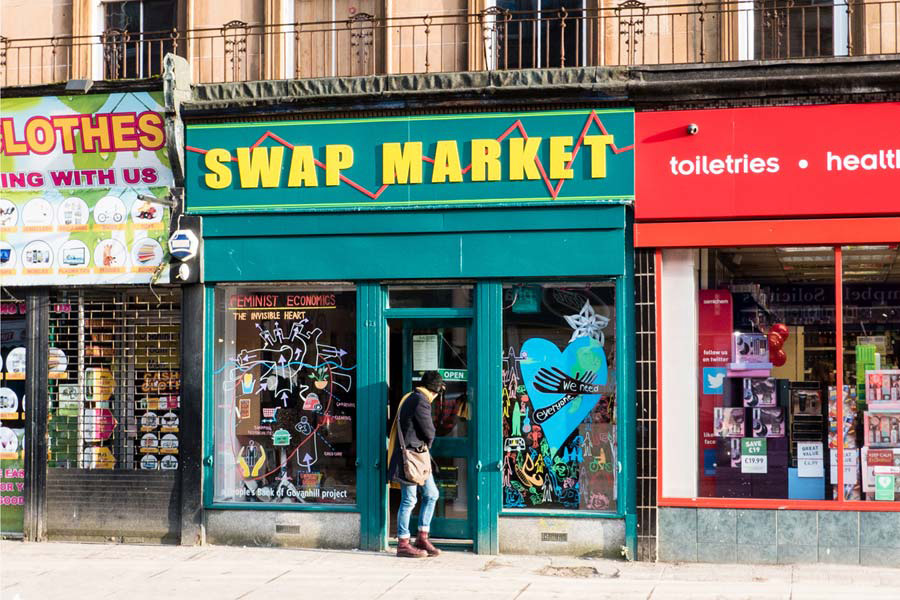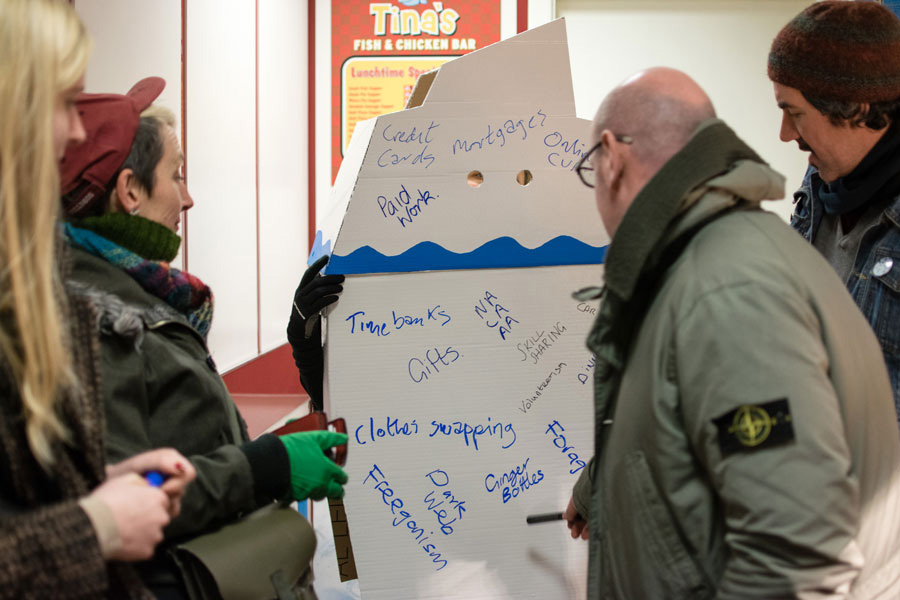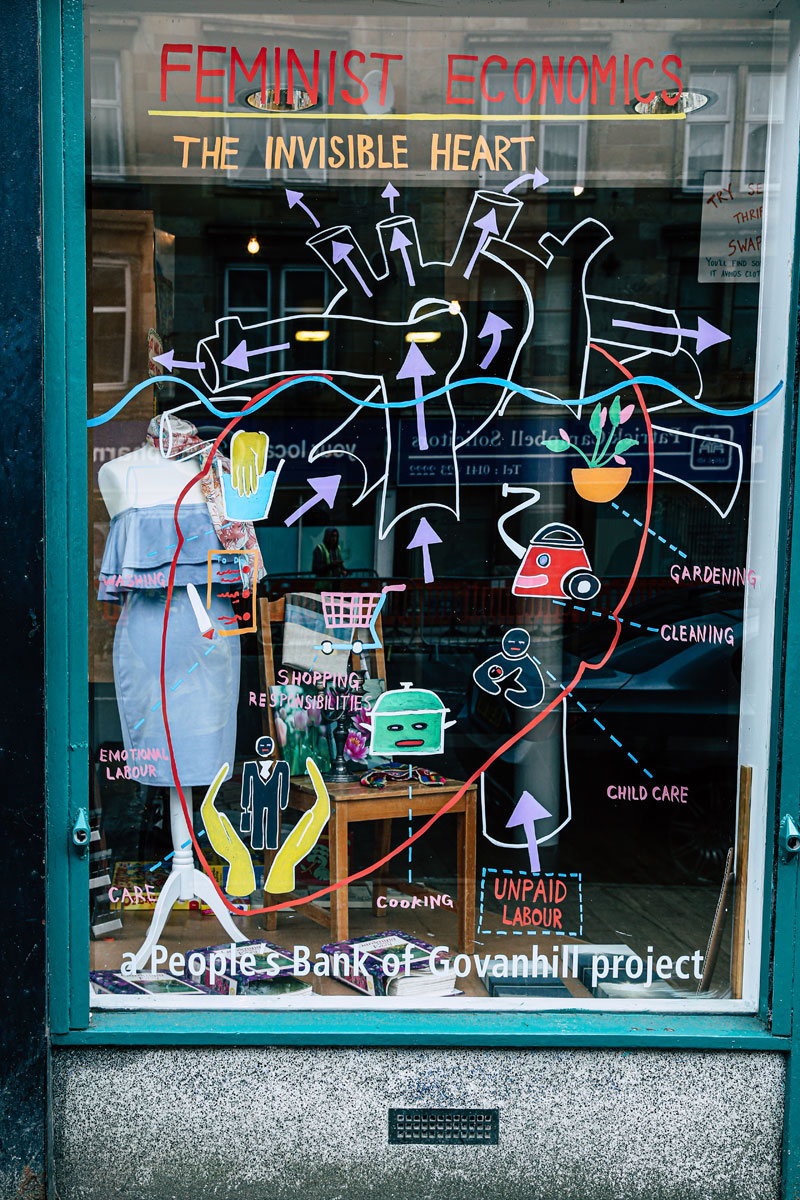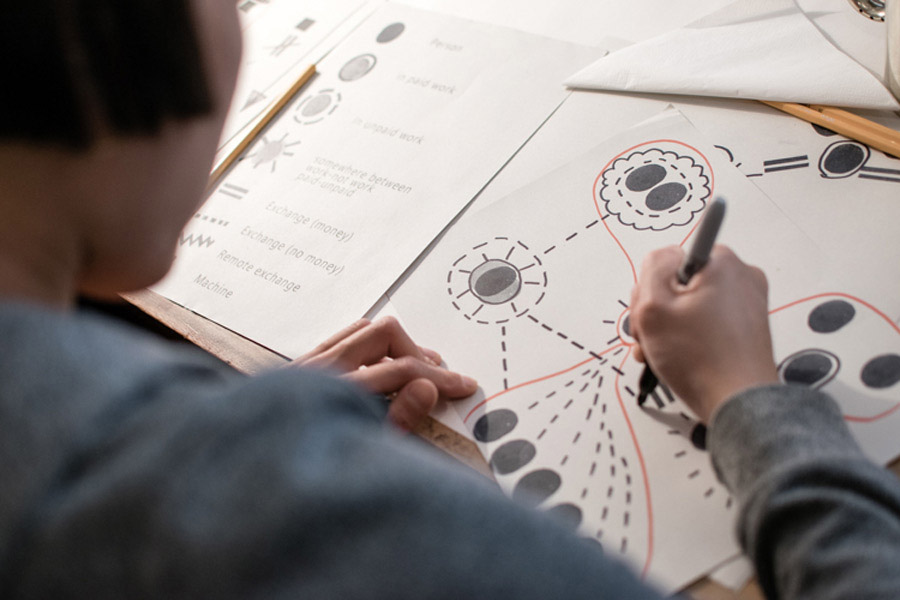Context:

The People’s Bank of Govanhill is a long term collaborative project, exploring ways of putting feminist economics into practice in community contexts, collectively ideating radically different economic models beyond capitalism. It is based within the Govanhill area of Glasgow, Scotland’s largest city, and was initiated by visual artist Ailie Rutherford, during a residency with Govanhill Baths Community Trust (a grassroots organisation formed to save the area’s historic public baths).
Transformative creative practice:

In 2015, Ailie Rutherford began mapping local networks of exchange in Govanhill, and exploring the potential for community currencies. She took these experiments to the streets, often performing as an iceberg – a visual metaphor for the feminist economy. She talked to local people about all the subsistence and care labour hidden blow the water line, and how this contributes to economic value, too.
“My practice is often about finding accessible ways to talk about feminist economics, so I did this performance in a chip shop, in a kebab house, on the street, encouraging people to add to the iceberg from their own experience. It’s about valuing the forms of labour and the ways of being that have been deliberately undervalued under capitalism – acknowledging that it’s often feminised labour such as care work that has been systematically devalued.” – Ailie Rutherford, Guest at Gray’s lecture, Feb 2022
The People’s Bank of Govanhill has grown from these early performances and currency experiments to include larger scale collaborations and inter-local projects across the globe, with one foot still very much rooted in the local community.

In 2018, Ailie and a team of women opened the Swap Market in a former pawn shop in Govanhill. This was a space to put feminist economics into practice within the local community. Over 1500 residents became members. They used the space to swap goods and skills, and to run music, language and film events. The project reflected Govanhill’s diversity, making space for different cultural backgrounds.
While working on the Swap Market project, the team of women co-organising the space became a more formally constituted women-led collective, the Feminist Exchange Network. This is inclusive of transgender and intersex women as well as non-binary and gender fluid people who are comfortable in a space that centres the experience of women.
Connections to eco-social sustainability:
The People’s Bank and Swap Market projects open up the ‘black box’ of the economy – going beyond the market focus that is so common in the mainstream media. This includes asking questions about planetary heath and the use of the earth’s resources. Feminist perspectives are often holistic, addressing questions of ecological and social wellbeing together. Ailie Rutherford’s practice centres on organising creative and accessible gathering spaces for people to explore these current problems on their own terms, and to create alternative ways of doing things together.
“We work together to build shared spaces, environments and systems that might just allow us to exchange and create in a world that will outlive capitalism… This work is really about connecting with people differently, finding joy together where we can. In a world that is so driven by individualism, competition and greed moments of real connection and collective action seem increasingly important” – Ailie Rutherford Guest at Gray’s lecture, Feb 2022
On learning and evaluation:

The People’s Bank and Swap Market projects work prefiguratively – their feminist aims are modelled by the project organisation in the design of all the activities. The rapid growth of the Swap Market led to reflection and further experimentation with modes of feminist governance. Rutherford and her colleagues Carmen Sawers, Caroline Darke and Elisa Bujokova now co-run a Community Interest Company called the Feminist Exchange Network, which also includes 20 associate members.
“What does feminist governance look like? How do we ensure that we don’t fall into the standard hierarchies as we grow? Or when things take us by surprise. It’s quite easy to do things in a way that counters the capitalist model when you’ve got plenty of time to think about it but when things take you by surprise you can more easily fall into those norms.” Ailie Rutherford
Nominator:
“The swap market, it’s such a simple thing – you bring something you take something away. It’s a rule set that allows people to spend time together. It allows people to think critically about something that’s part of their every day…It might be the first time anyone’s ever invited them to question what money is, or to think about the fact that they provide free care. It opens up the space to have different kinds of conversations – people start to question something that so fundamental as money and our relationship with it.” – Ruth Catlow, Furtherfield
Learn More:
Project credits:
Artists and activists who have collaborated with The People’s Bank of Govanhill, Feminist Exchange Network and Swap Market include: Ailie Rutherford, Inga Zaiceva, Calina Toqir, Monster Chetwynd, Rabiya Choudhry, Ellie Harrison, Zara Kitson, Rae-Yen Song, Sibell Barrowclough, Usma Ashraf, Rahela Cirpaci, Altron Hamilton, Alaya Ang, Najma Abukar, Carmen Sawers, Brian Morgan, Nadine Gorency, Katherine MacKinnon, Caroline Darke, Shreya Agarwal, Bettina Nissen, Libby Odai, Chrissie Ardill, Vishwanath Pasumarthi, Foxy, Dania Thomas, Raman Mundair, Elaine Gallagher, Layla-Roxanne Hill, AB Silvera, Sapna Agarwal, Deniz Uster, Magpie, Rumpus Room, Nat Walpole, Bob Moyler, Jean Cameron, Re-Peat, UNA festival, Saoirse Amira Anis, Mandy Roberts, Zineerah Ali, Maria Tolia, Thelma Okey-Adibe, Teresa Feldmann, COCO Collective, Más Arte Más Acción, Colectiva Curuba, Elsa Caucus, Padmini Ray-Marray and Arts Initiative Tokyo.